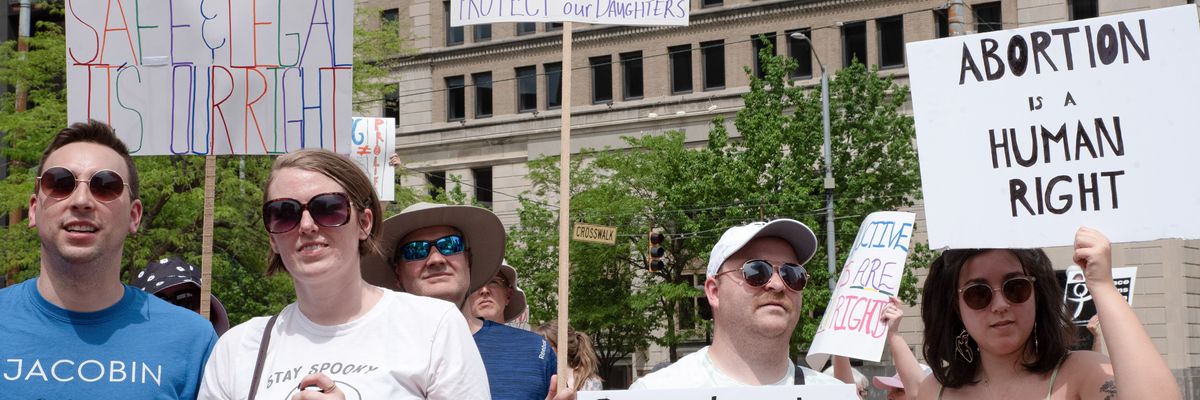A nonpartisan coalition on Wednesday submitted more than 700,000 signatures from Ohio residents across all 88 counties in a bid to qualify a referendum on whether to enshrine reproductive rights and abortion access in the state constitution.
Ohioans United for Reproductive Rights, which is backed by the Fairness Project, seeks to ensure that the
Right to Reproductive Freedom with Protections for Health and Safety Amendment is on the ballot for the November 2023 election.
The measure was filed earlier this year in response to the 6-3 ruling by the U.S. Supreme Court's reactionary majority in
Dobbs v. Jackson Women's Health Organization. That June 2022 decision overturned Roe v. Wade of 1973, eliminating the constitutional right to abortion. In the absence of federal protections, several GOP-controlled state legislatures, including Ohio's, have moved to prohibit or restrict abortion care, unleashing a life-threatening crisis condemned by United Nations experts as a violation of international human rights law.
"We have seen unprecedented levels of enthusiasm to defend abortion rights across the country through ballot measures—and now that movement has come to Ohio."
"This overwhelming show of support for reproductive freedom by Ohio voters is historic and inspiring," Kelly Hall, executive director of the Fairness Project, said Wednesday in a statement. "The
Dobbs decision was a dark day in our history that continues to have dire consequences on the health and well-being of countless Americans."
"But since that day, we have seen unprecedented levels of enthusiasm to defend abortion rights across the country through ballot measures—and now that movement has come to Ohio," said Hall. "The Fairness Project stands with Ohioans United for Reproductive Rights and is ready to support this critical ballot measure campaign however we can."
Ohio Secretary of State Frank LaRose (R) and county boards of elections have until July 25 to review the signatures submitted by the campaign. At least 413,487 valid signatures are required for the referendum to be placed on the November ballot.
Although Ohio's abortion ban is currently enjoined, there's an ongoing risk that the state Supreme Court's right-wing majority could reinstate it. However, if voters approve the Right to Reproductive Freedom with Protections for Health and Safety Amendment in November, any potential decision would be rendered moot.
Because the proposed ballot measure is a constitutional amendment, it would nullify existing abortion bans in Ohio and codify reproductive freedom throughout the state.
The Fairness Project warned that "special interests and extreme politicians including... LaRose—who is expected to announce a run for the U.S. Senate imminently—are already working to preempt the reproductive freedom amendment."
Last month, as
Common Dreams reported, the Ohio Supreme Court handed down a 4-3 opinion allowing a special election scheduled for August 8 to proceed despite the fact that Republican Gov. Mike DeWine signed a law earlier this year banning August elections in most cases.
The Ohio General Assembly called the August special election in an attempt to ram through Issue 1—a legislatively referred ballot measure that would increase the threshold required to amend the state constitution via referendum from a simple majority to a 60% supermajority—before November.
"Special interests and extreme politicians... are already working to preempt the reproductive freedom amendment."
A poll conducted last year by Baldwin Wallace University found that 59% of Ohio residents were in favor of a constitutional amendment to safeguard abortion access.
"Their true motivation" for holding the August election, Ohio House Minority Whip Jessica Miranda (D-28)
told Bolts last month, "aside from their insatiable desire for power, is to stop women from having the reproductive freedom that we so deserve."
The potential impacts of Issue 1—which would also make it more difficult for voters to get citizen-led initiatives onto future ballots—go beyond abortion rights. Efforts to raise the minimum wage, for example, could also be negatively affected.
Mia Lewis, associate director of Common Cause Ohio, told Bolts that the Republican proposal is "an attempt to fool voters into giving away their power."
The Fairness Project is actively supporting the
One Person, One Vote: Vote No in August campaign to defeat the Ohio GOP's assault on popular democracy as part of its Ballot Measure Rescue Campaign.
Last year, the group helped the Michigan Reproductive Freedom for All campaign and the Vermont for Reproductive Liberty campaign to pass constitutional amendments in each state upholding reproductive rights through ballot initiatives.
